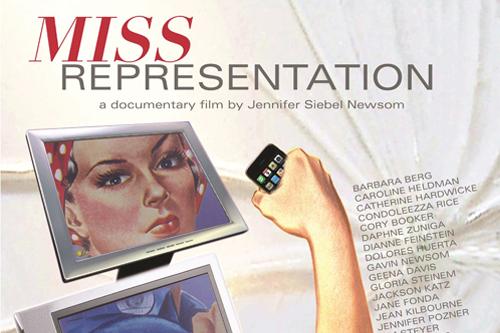Last Wednesday, Plum was lucky enough to attend a screening of the documentary “Miss Representation,” by Jennifer Siebel Newsom. This film has been making waves after being shown at the Sundance Film Festival 2011 and on OWN, the Oprah Winfrey Network. As both a woman and a media-conscious person, I was curious to see what it was all about.
The film analyzes the negative impact the media has on the minds of young girls and women. This, of course, is not new information, per se. However, "Miss Representation" stood out to me because it delved deeper than just saying (I am paraphrasing) 'media representations of scantily-clad women are bad for our daughters because they objectify women.' In short, what I took away from the film is that a culture as a whole is deeply affected by these images, men, women, and children alike.
The point that the film makes is that we all grow up in a society that largely focuses on a woman's appearance rather than her intellectual value, and this is harmful to us all. Children are raised in an environment in which they all learn to believe that women do not make good leaders. When they reach adulthood, few women are prepared to aspire to leadership roles, and there are men who are prepared to quash the ones who do. And then suddenly you find yourself living in a country that is 51% women aaand...represented by only 25% of the parliament. Stat here Yikes!
"Miss Representation" celebrates strong female role models with the aim of counteracting the outpouring of negative, sexist messages we are often subjected to. Interviews are conducted with "politicians, journalists, entertainers, activists, and academics, like Condoleezza Rice, Nancy Pelosi, Katie Couric, Rachel Maddow, Margaret Cho, Rosario Dawson, and Gloria Steinem." -Miss Representation 'About the Film' page The interviews generally revolve around their experiences as women in the public eye (and under public scrutiny) -the challenges, but also the victories.
My only critique of "Miss Representation" (you may already be able to guess it, based on the list of interviewees) is that it has a significantly American slant. For example, one of the more shocking facts they throw out, hold on to your hats, is that Iraq and Afghanistan both have more female members of parliament than the United States. That being said, the majority of the examples they use are valid the world over, if indirectly.
Nevertheless, seeing the film was a moving and challenging experience, and I would wholehartedly recommend seeing it, and sharing it! I left the theatre with a new internal mantra: Lead by example and become a role model as a strong and confident woman, not only for your own benefit, but for the benefit of those around you as well. (Hmm yes, Ok, it's a bit wordy, but I think I can make it work).
You can read all about the Miss Representation misson here: Miss Representation Homepage
The film inspired me. Who, or what, inspires you? Leave a comment here or tweet me @PlumClothing!




